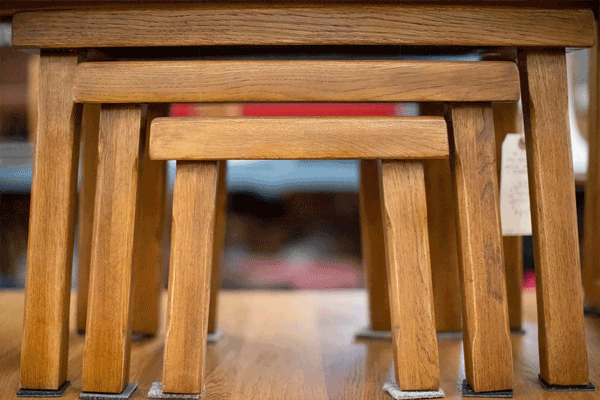Secondhand Tunes
- Share via
When the recording industry introduced the compact disc in 1983, it touted the product’s long-lasting quality. But by developing a more durable disc, the industry created unwanted competition as used-CD stores gained in popularity.
In the San Fernando Valley, the Yellow Pages directory lists at least 17 sites where music fans can dump unwanted CDs or add new ones to their collections.
“It’s exploded in the last three or four years,” said Howard Buchanan, store manager at Moby Disc in Sherman Oaks.
Just as garage sale junkies build their weekend schedules around their buying habits, plenty of music consumers make weekly or monthly trips to the used-CD store.
Some spend as little as $15 a month looking for specific titles; others shell out as much as $200 every 30 days to sustain their passion.
The album jacket might sport a coffee stain, the plastic jewel case might be cracked or the CD itself might have a couple of ominous marks. But usually the music is unadulterated.
Fifteen-year-old Aaron Brownstein, a student at Oakwood Secondary School in North Hollywood, said he does not mind slightly soiled covers.
“Somebody else is willing to buy mine,” Brownstein said. “No need to be picky.”
The Pros of Buying Used
Reasons for buying used CDs rather than new ones vary. Some, such as Brownstein, are in search of hard-to-find albums by underground bands or out-of-print CDs no longer stocked by traditional music retailers.
Others, such as Woodland Hills resident Brady Rifkin, 34, look for bargains in one store that they think they can sell for a profit elsewhere.
“After you’ve been doing this awhile, you have an experience and history with a whole lot of music and CDs,” said Rifkin, who resells music to other stores and has his own online company for used products.
“You know what’s out, what people are looking for and what you can make money off of,” he said.
Other buyers are price-conscious, looking to cut their expenses in half.
The suggested list price for most major new releases is $18.98, and music chains typically sell them for $15 or more. The Record Town at Westfield Shoppingtown Topanga in Canoga Park sells many of its new albums for $19.99, a full dollar above the manufacturer’s suggested list price.
By contrast, Secondspin.com, a used-CD store in Sherman Oaks, recently had the current Eminem and Sting albums priced at $7.99.
“It seems economically to be more feasible to buy two used CDs for the price of a new one,” said William Woff, 44, who has been buying recycled discs for eight years. “I think we can all remember back to 1983 [when the labels said,] ‘Oh, this is just the initial price. The price is gonna come down in a few years.’ That’s been one big lie.”
Record labels are not particularly happy that retailers are selling used CDs. It is “intrinsically irritating,” said Randall Kennedy, vice president of sales and marketing for jazz at Warner Bros. in Burbank.
Used CDs have become so popular that the Wherehouse chain, which once stocked only new albums, has its own section for recirculated discs.
Because labels pay retailers for display space in stores, record executives said they find it troubling that customers can see a display for a new CD in one part of a store, but can buy it at a discounted price in another part of the same store.
“It’s tough when you see a Wherehouse store allot 20% of its floor space to used CDs when we’re trying to break new artists,” Kennedy said. “That space in the rest of the store becomes more expensive and gets secondary positioning.”
But employees of record labels often add to the used retailers’ stock. Kennedy recalls that when he worked at Aron’s Records, which sells used albums in Hollywood, “I saw virtually every executive in the business.”
Some radio executives and music journalists who receive free promotional albums often sell their unwanted music to used-CD stores for extra cash.
“Everyone just turns their back on that,” said Jeremy White, Secondspin.com’s manager.
Secondspin is one of the largest used-CD retailers in the Valley.
Its Ventura Boulevard store features new stock and a 99-cent bin.
It has a well-organized catalog section where albums are kept alphabetically by artist and listening stations in a corner where customers can check discs for defects before buying.
Its computer system tracks inventory by title, and a guide produced in-house, much like the auto industry’s Blue Book, dictates its pricing.
Moby Disc, which has six stores in the Los Angeles area and plans to add more, is less interested in mainstream product, preferring to attract customers with more specialized musical tastes.
As a result, the company is less rigid, relying on employees--rather than technology--to stock the bins.
“If someone takes a CD down the street to Secondspin, they may have difficulty selling it because the computer doesn’t know about it,” said Moby Disc’s Howard.
“If they try to bring it here, there’s a fair chance that an experienced human buyer might recognize something about it that they can identify that would be of value to a music fan or a collector.”
The Lessons of Veterans
The rest of the used-CD landscape is dominated by smaller operations, including mainstay Heavy Rotation in Studio City.
Many, including Record Trader in Reseda and Burbank outlets Atomic Records and DB Cooper’s Wholesale Music Exchange, sell anachronistic vinyl, as well as CDs.
Newcomers to the used market might benefit from the lessons learned by longtime traders and store managers.
The start of a new month produces a slight bulge in the amount of music available, said Secondspin’s White, because some consumers sell their music collections to pay rent.
Woff, an avid blues collector, said industry insiders often sell their unwanted CDs within six weeks of an album’s release. He subscribes to Ice magazine, which lists album release dates, and targets some of his buying trips to shortly after the release of an offbeat album that music executives are likely to sell.
Consumers and store managers agree that used-CD buyers should check discs for scratches or listen to them to make sure they do not skip.
It may not be as expensive as a used car, but nobody wants a lemon.
More to Read
Inside the business of entertainment
The Wide Shot brings you news, analysis and insights on everything from streaming wars to production — and what it all means for the future.
You may occasionally receive promotional content from the Los Angeles Times.










